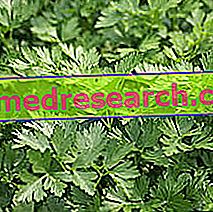
Scientific name
Petroselinum sativum
Family
Apiaceae
Origin
Europe, the Mediterranean basin.
Synonyms
Parsley
Used Parts
The drug is given by the whole plant, therefore fruits, roots and leaves
Chemical constituents
- Essential oil (apiolo, myristicin);
- Flavonoids;
- Furocumarine (bergaptene).
Parsley in Herbalist: Property of Parsley
Parsley is used for digestive and carminative purposes in the form of an infusion (seeds); the decoction, instead, finds application in folk medicine as a powerful diuretic and in disorders related to the menstrual cycle.
Biological activity
Parsley has been shown to possess a marked diuretic effect, which appears to be exercised through a mechanism of inhibition of the sodium-potassium pump (or Na + / K + ATPase, or Na + / K + ATP-dependent pump) present in the kidney, decreasing in this way sodium reabsorption and potassium secretion, and favoring the recall of water in the tubular lumen, with consequent diuretic effect.
More in detail, some studies conducted on animals have shown that parsley - when taken in small doses - performs a diuretic action. If, instead, it is taken at higher doses, it is able to increase the contractility of the smooth muscles of the intestine, bladder and uterus.
The stimulation of the contraction of smooth muscles is to be attributed above all to the bee contained in the essential oil of the plant.
Parsley against urinary tract infections and to prevent kidney stones
As mentioned, parsley has a marked diuretic action. This activity is used to promote the healing of urinary tract infections and to prevent the onset of kidney stones and bladder, thanks to the washing action exerted by the same urine.
As an indication, if parsley is taken as an infusion, it is generally recommended to prepare the drink using about 2 grams of finely cut drug.
Parsley in folk medicine and homeopathy
In popular medicine, parsley - as well as a diuretic - is also used to treat gastrointestinal disorders, jaundice, inflammation of the kidneys and bladder, and even as an emmenagogue remedy.
Parsley fruits, on the other hand, are exploited by traditional medicine as a digestive remedy and for the treatment of disorders of the kidneys and urinary tract and disorders related to the menstrual cycle.
Parsley is also used in homeopathic medicine where it can be found in the form of granules. In this context, the plant is used for the treatment of urinary tract infections, cystitis, urethritis and overactive bladder.
The amount of homeopathic remedy to be taken may vary from individual to individual, also depending on the ailment to be treated and the type of homeopathic dilution that is intended to be used.
Side effects
Generally, parsley, if properly used, does not cause any side effects of any kind.
However, contact allergies may rarely occur. Furthermore, photodermatosis may occur following prolonged contact of the newly harvested plant with the skin.
Following the intake of too high doses of parsley essential oil or preparations containing high quantities of essential oil, overdose and poisoning may occur. The typical symptoms of intoxication consist of: high contraction of smooth muscles (especially those of the urinary tract, intestine and uterus), anuria, faeces with blood, bleeding from mucous membranes, hemolysis and cachexia.
Contraindications
Avoid use in cases of kidney disease, chronic hepatitis or established hypersensitivity to one or more components of parsley.
Furthermore, due to the stimulation of uterine contractions exerted by the apiol which can have abortive effects, the use of the essential oil of parsley or its preparations is absolutely contraindicated in pregnant women (including therapeutic doses).
Warnings
As mentioned, it is necessary to pay a lot of attention in the use of the essential oil of parsley, since, at high doses, it involves damage to the hepatic and renal parenchyma, neurotoxicity and can be abortive. Therefore, neither the essential oil, nor the fruits should be used for healing purposes, if not without apiolo.
Pharmacological Interactions
- MAO;
- Photosensitizing drugs.



